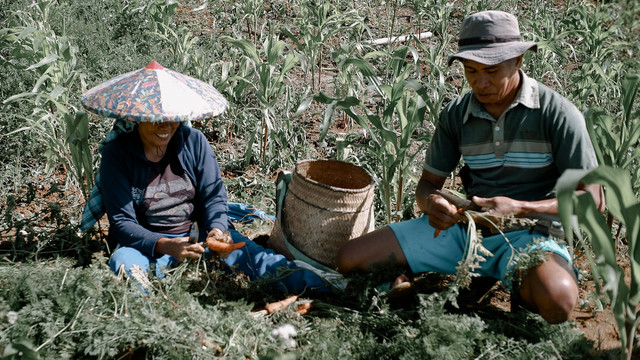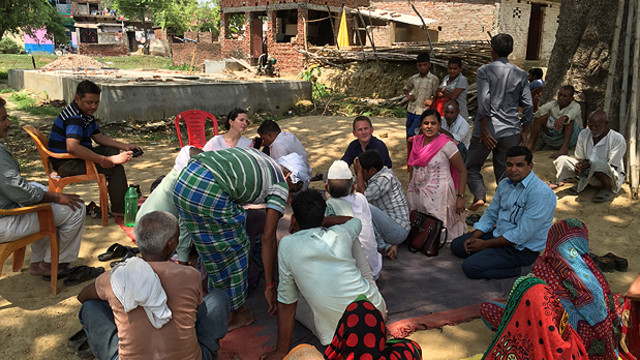Which factors are key for successful social learning?
A workshop organised by the International Institute for Environment and Development helped put the final touches on a forthcoming monitoring and evaluation framework, summarising key factors that influence social learning processes


Participants at the CGIAR Climate Social Learning evidence gathering workshop, including IIED director of communications Liz Carlile (standing) (Photo: CCAFS)
"You are brave, trying to find common ground on this very challenging issue. But, how should you prove that social learning has a value?" said Barbara Van Mierlo, monitoring and evaluation expert at the end of the two-day social learning workshop in June.
Her words did ring true to us. How do we show others what we are already believing, that social learning has a role to play in achieving sustainable development outcomes? Were we mad? Could we really pull this off?
Pioneering social learning research
The social learning event was held as part of a broader activity on gathering social learning case studies and evidence while shaping a framework that will help evaluate these projects in a unified way.
Through building this framework and finding appropriate climate change-related case studies to evaluate, we, the Climate Change and Social Learning initiative, are pioneering in social learning research. This makes it very hard and confusing at times and it's what gives us the impression that we are mad.
Although mentioned a few times during the event – how complex social learning and its many dimensions is – many of the conference participants agreed that we need to continue on our journey, with the conference forming a crucial part in doing so.
Starting from the beginning: what is social learning?
Social learning is a very theoretical concept that should be revisited and continuously discussed in order to match reality. So what is it? A fad, fairytale or even a fallacy? Is it even functional? And when is it appropriate or interesting to use social learning?
Social learning for us is all about doing things differently, moving from a top-down, non-inclusive development approach to participatory, bottom-up where stakeholder insights and expertise infiltrate outcomes and decisions made.
Social learning doesn't stop there though, as it is much more than participation. It is about revisiting decisions, re-iterating what has been learned and changing practices to be even more inclusive, analysing who is participating, why and much more. Through iterative social learning, institutions and governance system can be pushed to change and to do things differently, become more transparent, open, participatory and listen to its stakeholders.
Our ambitions for social learning are set high, as we believe these processes can facilitate and contribute to smarter, more effective, research-for-development institutions and help these institutions achieve more sustainable results, measured as development outcomes.
The goal is for organisations and institutions to know where social learning approaches can improve a project process and help achieve set outcomes, and where social learning is not the way to go. Having said that, social learning could be seen as having a few drawbacks such as high transaction costs (how do you monitor learning processes efficiently within a set timeframe?). The concept is still quite elusive and abstract, and the CCSL initiative needs to ensure it is applicable in the real world.
Among the presentations at the workshop was one by IIED director of communications Liz Carlile that covered the basis of what social learning is and isn't:
How do you know if a project is 'doing' social learning?
We evaluated which social learning characteristics or areas were the most important to the group at the learning event. This in order to understand what a social learning project is and monitor it better. These areas will shape a monitoring and evaluation framework to be released later this year by the Climate Change and Social Learning (CCSL) initiative:
- Looped learning: mechanisms are in place to ensure an iterative and ever deeper process of collective reflection and learning
- Power dynamics: analysis of how power dynamics shapes relations and decision-making among and between stakeholders is included or at least reflected upon
- Engagement: analysis or reflection over who is engaged, why and how
- Institutional opportunities and barriers: analysis or reflecting over what in organisations and institutional systems is hindering or helping social learning
- Capacity: the capacity of the people participating in the project to contribute meaningfully to social learning processes, and how to develop that capacity.
Without featuring these key areas, which eventually will lead to project indicators, it would be hard to argue that a project is 'doing' social learning.
We also wanted to open up the floor to the participants to tell us what they saw as "missing areas" among the indicators. Some of these include: trust building; learning to value local knowledge; and flexibility from a planning and financial standpoint and creating room to fail, all of which are important indicators for a social learning project.
"We've made good progress in the workshop towards a simple yet general monitoring and evaluation framework for evaluating the social learning components of a wide variety of different projects. There is still work to do, but we have something that can be built on," said theme leader Philip Thornton, whose theme Data and Tools is co-leading the CCSL initiative's work at the end of the learning event.
To respond to the question posed by monitoring and evaluation expert Barbara Van Mierlo: we believe that by putting together this framework, and by subsequently evaluating and monitor case studies that we think are doing social learning and see what results they are achieving, we will be able to show how social learning is adding value to climate change projects.
To answer the question on what social learning is in practice, we presented a number of climate change-related social learning-type projects at the event. The case studies presented all had elements of participation, possibilities to discuss the project outcomes and processes and active learning from own experiences.
However, there were many areas where the projects could further integrate social learning processes, and the project participants all went home with ideas on how this could be done, based on the key indicators listed.
A full list of social learning case studies is available, while photos from the event are available on the CCAFS Flickr site.
Cecilia Schubert is communications officer at CGIAR Research Program on Climate Change, Agriculture and Food Security (CCAFS), where this blog was originally posted. Valuable inputs were made by Ewen LeBorgne of International Livestock Research Institute.



